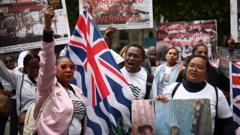**UK's Labour leader Sir Keir Starmer finalizes a significant deal with Mauritius over the Chagos Islands, igniting debates on sovereignty, military presence, and the rights of the Chagossian people.**
**UK's Controversial £101m Annual Agreement to Hand Over Chagos Islands**

**UK's Controversial £101m Annual Agreement to Hand Over Chagos Islands**
**Prime Minister's historic deal faces backlash as Chagossians express concerns**
In a landmark move, UK Prime Minister Sir Keir Starmer recently signed a £101 million annual agreement to transfer sovereignty of the Chagos Islands to Mauritius while retaining access to the Diego Garcia military base. Starmer described this deal, which spans an initial 99 years with a potential 40-year extension, as vital for the UK's national security, ensuring operational continuity of the military base.
The agreement comes on the heels of a failed legal challenge by two Chagossian women, Bernadette Dugasse and Bertrice Pompe, who argued that their rights and opinions were not sufficiently considered in the negotiations. Under the terms, Mauritius acquires official ownership of the islands but must allow UK and US military operations on Diego Garcia, protecting it from external threats, including from China, which Conservative critics claim could undermine UK's position.
Starmer claims the deal mitigates immediate legal risks from Mauritius, asserting a strategic necessity to prevent foreign bases from cropping up near Diego Garcia. The treaty plans to establish a 24-mile exclusion zone around the military base, wherein the UK holds veto rights over foreign access.
Despite Starmer's assurances, criticism has surged from various opposition factions, particularly regarding the financial implications and the implications for national security amidst growing ties between Mauritius and China. Kemi Badenoch of the Conservative Party labeled the agreement "an act of national self-harm," while Reform UK’s Nigel Farage contemplates the detrimental impact on Britain's interests.
In contrast, the Chagossian community exhibits diverging sentiments. While some members celebrated the agreement in Mauritius as a victory for their ancestral claims, leaders like Jemmy Simon voiced mistrust towards Mauritius’s intentions regarding repatriation rights and potential discrimination against Chagossians.
This deal extends from historical grievances dating back to the 1965 separation of Chagos from Mauritius, a decision made when the latter was a British colony. Despite being forcibly removed under the 1971 immigration order, opinions within the Chagossian community vary — with some advocating for a return to the islands while others prioritize their rights in the UK.
As this contentious agreement approaches parliamentary approval, the broader implications of Chagossian sovereignty, military strategy, and international relations remain a focal point in the political landscape.



















